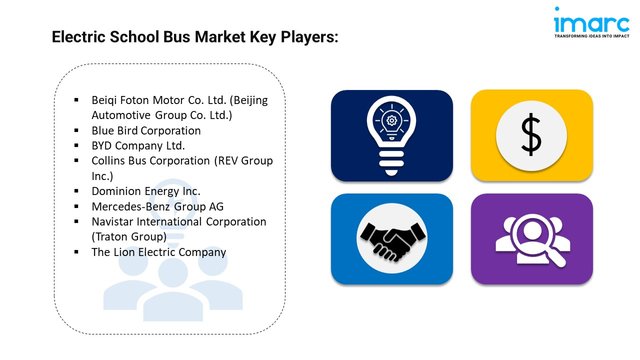
Market Overview:
The electric school bus market is experiencing rapid growth, driven by environmental mandates & funding, technological advancements & efficiency and community engagement & public awareness. According to IMARC Group’s latest research publication, “Electric School Bus Market Size, Share, Trends and Forecast by Type, Capacity Design Type, Sales Channel, Application, and Region 2025-2033“, The global electric school bus market size was valued at USD 35.5 Billion in 2024. Looking forward, IMARC Group estimates the market to reach USD 335.3 Billion by 2033, exhibiting a CAGR of 28.33% during 2025-2033.
This detailed analysis primarily encompasses industry size, business trends, market share, key growth factors, and regional forecasts. The report offers a comprehensive overview and integrates research findings, market assessments, and data from different sources. It also includes pivotal market dynamics like drivers and challenges, while also highlighting growth opportunities, financial insights, technological improvements, emerging trends, and innovations. Besides this, the report provides regional market evaluation, along with a competitive landscape analysis.
Grab a sample PDF of this report: https://www.imarcgroup.com/electric-school-bus-market/requestsample
Our report includes:
Factors Affecting the Growth of the Electric School Bus Industry:
The electric school bus market is experiencing significant growth that is driven by the strategic development of strong political promotion and support infrastructure. This dynamic receives fuel from the increasing recognition of the environment and health benefits associated with infection in zero-furnace transport, especially for children. In addition, the government's initiative on local, state and federal levels provides sufficient funds, grants and tax credit to encourage the adoption of electric school buses. Taking into account the installation of charging infrastructure, including depot charging and charging solutions, is important to ensure the operational feasibility of the electric fleet. Networking and increasing demand for smart charging technologies invests in the development of infrastructure. Emphasis of developing capabilities for driving to the network are able to contribute with electric school buses to web stability and provide backup during an emergency. Increasing public privat participation accelerates the deployment of electric school buses and charging infrastructure. The development of standardized charging protocols and interoperability standards is to ensure spontaneous integration of electric buses with existing grid infrastructure. Increasing the demand for training programs and technical assistance supports school districts in electric fleet infections. Extensive fleet optimizes the focus on energy consumption and maintenance programs to develop control systems and data analysis platforms.
The electric school bus market looks at the market that sees a strong tendency for rapid technological progress and performance creation, which is inspired to increase the boundary, reliability and efficiency. This dynamic receives fuel by continuous improvement in battery technology, resulting in an increase in energy density, fast charging time and extended battery life. In addition, integration of advanced electric powertrains and regenerative braking systems maximizes energy efficiency and reduces operating costs. Focusing on developing light and durable bus chassis and body design improves the performance of the vehicle and reduces energy consumption. Increasing demand for advanced telematics and fleet control systems enables surveillance of real-time and adaptation to the vehicle's performance. The emphasis on developing intelligent climate control systems and thermal control solutions increases passenger comfort and expands battery life. Increasing the advanced driver's assistance system (ADAS) and the safety facilities improve the safety of the vehicle and reduce the stepness of the driver. Development of standardized battery modules and charging interfaces increases the interpretation and reduces the cost of maintenance. Over-the-AIR (OTA) software updates and increasing demand for external diagnostics are enabled to continuously improve and adapt to the performance of the vehicle. This technology driven is not just about electrification buses; It is about creating a very efficient, reliable and intelligent transport system that meets the requirements for modern school bus operations.
The electric school bus market is experiencing the market's community engagement and increasing pressure on educational search, which is motivated by the need to create public awareness, promote fetal support and promote sustainable transport practices. It is fuel by increasing efforts from school districts, spokesman groups and industry interests to become a member of dynamic parents, students and community members. In addition, it is important to focus on showing the environment and health benefits of electric school buses and meeting possible concerns about creation and limit, credibility and security for public support. The increasing demand for educational programs and outreach initiatives provides awareness of the benefits of electricity transport and the benefits of promoting the Vote education. The emphasis on providing learning experiences and interactive performances on hands is to wrap students and motivate the next generation of engineers and environmentalists. Expanding pilot programs and performance projects is a demonstration of the benefits of the electric school buses and the Construction Community Trust. The development of partnerships with local businesses and social organizations expands the access and effect of educational searching efforts. The increasing demand for transparent data and performance matrix is to create accountability and promote informed decision -making. Focusing on highlighting the positive effect of electric school buses on local economies and employment generation promotes social support and sustainable development. This engagement drive is not just about selling buses; It is about creating a consensus on a strong society and promoting a shared commitment to a cleaner, healthy and more durable future.
Leading Companies Operating in the Global Electric School Bus Industry:
